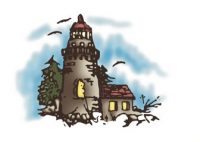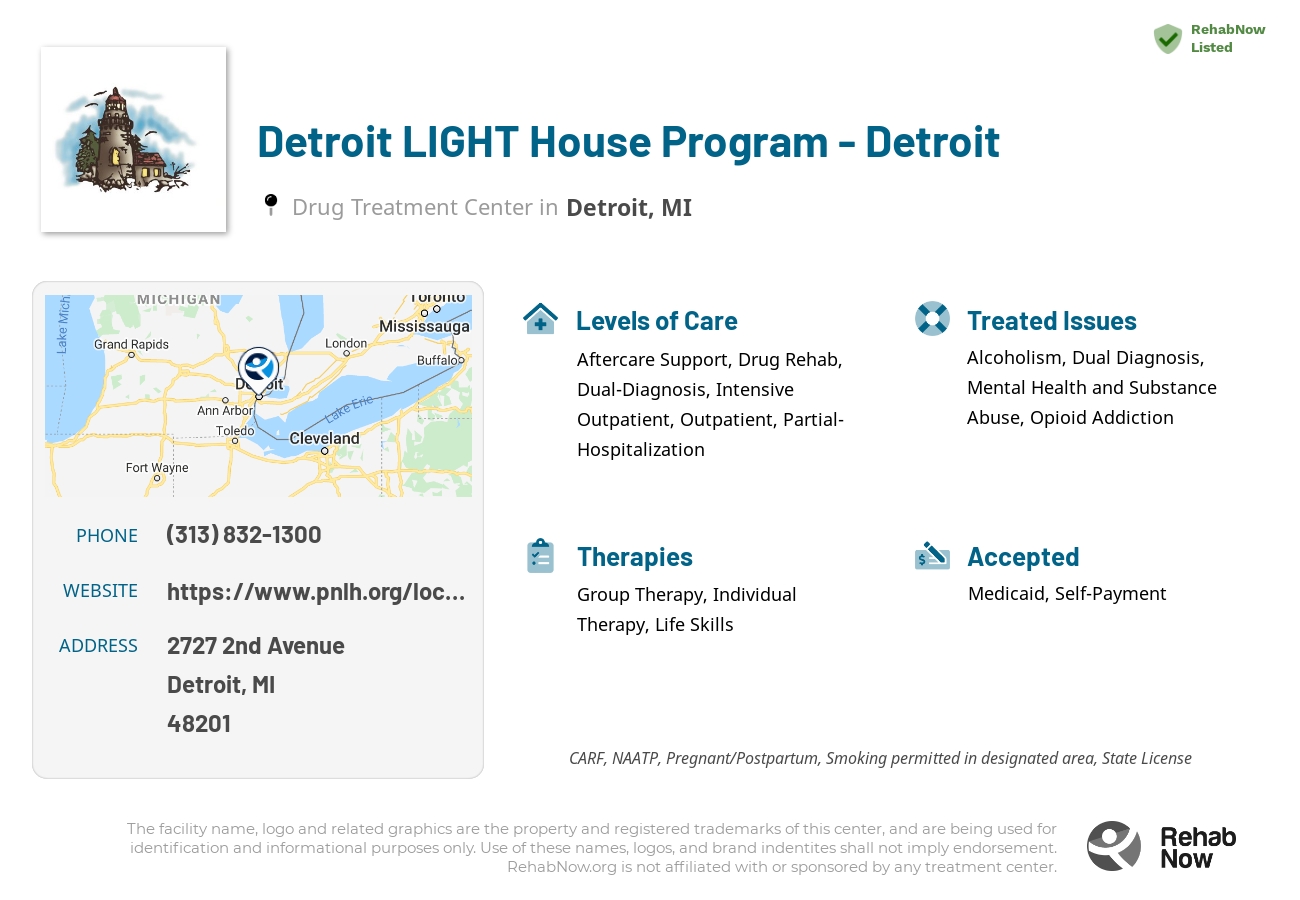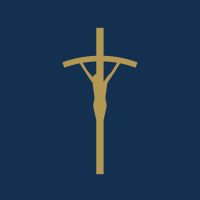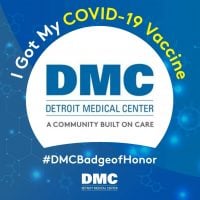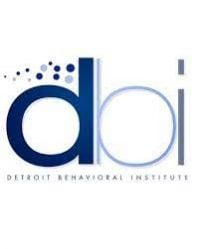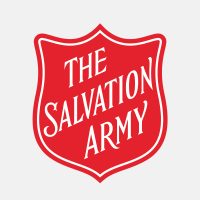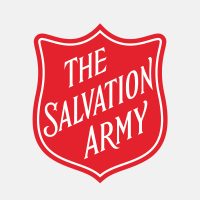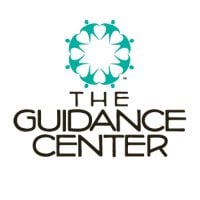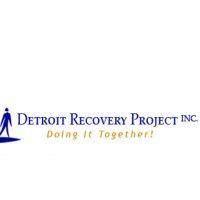Detroit LIGHT House Program - Detroit
Drug Rehab Center in Detroit, Michigan
The Detroit LIGHT House Program is a rehabilitation center in Michigan offering evidence-based treatment, focusing on family involvement and community engagement, providing holistic care including counseling, 12-step programs, life and job skills classes, and specialized programs for adolescents and young adults, and implementing cutting-edge digital tools for best-in-class care.
Multiple patients have reported Detroit LIGHT House Program - Detroit as permanently closed.
Research other rehabs in Detroit, Michigan, or get help finding an open facility.
About Detroit LIGHT House Program - Detroit in Michigan
The Detroit LIGHT House Program - Detroit is a rehabilitation center located in Detroit, Michigan that provides high quality treatment to individuals dealing with addiction, substance abuse, and mental health issues. The program features an evidence-based approach to treatment, designed to not just treat the symptoms of the condition but to address the underlying causes of addiction and create a path to lifelong sobriety. The program also focuses on family involvement and community engagement as a key part of the recovery process.
Detroit LIGHT House Program - Detroit provides a holistic approach to treatment, with a focus on physical, mental and emotional health. Services include individual and group counseling, 12-step programs, relapse prevention, and educational enrichment. In addition, clients have access to life and job skills classes, nutrition counseling and recreational activities. The program also offers specialized programs for adolescents and young adults, including yoga, meditation and mindfulness practices.
Detroit LIGHT House Program - Detroit is accredited by the Commission on Accreditation of Rehabilitation Facilities (CARF) and is a licensed provider of addiction services in the state of Michigan. Additionally, the program has received numerous awards, such as the Michigan Quality Council Excellence Award and the Commonwealth Fund Quality Improvement Award. Additionally, the program implements cutting-edge digital tools, such as secure video conferencing and remote monitoring, to ensure best-in-class care.
Genders
Ages
Modality
Additional
Conditions and Issues Treated
Opioid addiction starts when a person becomes addicted to legal or illegal opioids. The addiction can happen quickly, in just a matter of days. Opioid withdrawal can be extremely uncomfortable and lead the user to continue to use even if they want to quit. Stopping using an opioid requires medical observation. Sometimes inpatient treatment with a medically supervised detox is necessary for managing the withdrawal process while learning lasting tools for maintaining recovery. Medications may be used in some cases of opioid addiction.
Opioid addiction is one of Michigan‘s most prominent forms of addiction. It’s treated by detoxifying the body so that the chemicals from the medications no longer impact them and by therapies to correct behavior and target the root of the problem.
Recovery is not simply about stopping drug use. Recovery is working with addiction while recovering mental health issues that are fueling the addiction in the first place.
Levels of Care Offered
This center offers a variety of custom treatment tailored to individual recovery. Currently available are Aftercare Support, Drug Rehab, Dual-Diagnosis, Intensive Outpatient, Outpatient, Partial-Hospitalization, with additional therapies available as listed below.
Addicts who need help with their addiction can enroll in an intensive outpatient program (IOP). But the patient won’t live there during treatment.
IOP involves patients visiting a medical office building regularly for therapy and other services while continuing to live their lives.
IOP is a step up from drug or alcohol detox, but it’s still a phase of recovery, not the end goal. Patients in need of IOP have many options for rehab and treatment.
Outpatient treatment is considered the lower intensity level of addiction treatment. It’s ideal for early phase addiction or lower intensity addictions. It may include weekly sessions instead of daily. It may include weekly sessions instead of daily. Peer group support, 12-step programs, and individual counseling may still be involved but at a lesser frequency than an intensive outpatient program. It is a good choice for someone who doesn’t need to go through a medically supervised detox and who has a supportive home environment. It requires motivation and dedication to commit to the program without constant monitoring.
PHP is a program where the individual is cared for in a hospital-like environment during the struggle of those symptoms, but still have some of the freedoms of an outpatient form of treatment. The individual may sleep at the facility each night, or they may sleep at home, but all have more monitoring than an outpatient treatment program typically offers. A PHP is able to live at home, attend school, work or perform other daily activities. This appeals to many families due to the ability of their loved one to still have some freedoms while also receiving treatment for their addiction.
Aftercare support should take place after outpatient treatment has ended. There are a few different types of aftercare support that patients can seek. These include 12 Step, Self-help groups (AA, NA), Therapeutic communities, Long-term, structured sober living arrangements, and Halfway houses (residential treatment centers).
Therapies & Programs
Individual therapy involves one-on-one sessions between the patient and therapist. It provides patients with a safe environment to openly discuss personal and sensitive issues with the therapist. They find the therapist as someone they can trust. Individual therapy aims to identify the core issues that would have led the patient to substance abuse and address them effectively. The therapist can develop patient-specific customized solutions through individual therapy, which aids speedier recovery.
Groups typically involve meetings with other recovering addicts who can relate to one another’s experiences. They might meet in person or online and typically focus on the process of staying sober rather than overcoming a specific addiction.
In these groups managed by Detroit LIGHT House Program - Detroit, addicts can build a sense of community and develop strong emotional connections with others who understand what they are going through. These beneficial relationships can help addicts overcome their cravings and prevent relapse at any point during the recovery process.
Since addiction is a chronic physical and mental illness, addicts need to learn as many life skills as possible. Many drug treatment centers offer life skills activities as part of their addiction recovery programs. Examples include cooking classes, employment training, resume writing seminars, parenting classes, and computer training. Life skills activities help addicts find employment, take care of their families, and give back to the community.
Payment Options Accepted
For specific insurance or payment methods please contact us.
Personalized Nursing LIGHT House Associated Centers
Discover treatment facilities under the same provider.
- Personalized Nursing Light House in Plymouth, MI
- Personalized Nursing LIGHT House - Dearborn Heights in Dearborn Heights, MI
- Personalized Nursing LIGHT House - Canton in Canton, MI
- Personalized Nursing LIGHT House - Plymouth in Plymouth, MI
- Personalized Nursing LIGHT House - Farmington in Farmington, MI
Learn More About Personalized Nursing LIGHT House Centers
Additional Details
Specifics, location, and helpful extra information.
Detroit, Michigan 48201 Phone Number(313) 832-1300 Meta DetailsUpdated November 25, 2023
Staff Verified
Detroit LIGHT House Program - Detroit Patient Reviews
There are no reviews yet. Be the first one to write one.
Detroit, Michigan Addiction Information
Michigan has the second-highest rate of drug and alcohol abuse in the nation. Heroin is linked to more than 50% of the state's hepatitis C cases. Marijuana is the drug most often associated with crimes in Michigan, followed by methamphetamines. Opioids alone are responsible for almost 20% of all drug overdose deaths in Michigan.
Over 1,000 drug-related overdose deaths occurred in Detroit, Michigan, in 2017 alone. Opioids (42%) and benzodiazepines (22%) are the most common drugs involved in overdose deaths. Drug overdoses killed more people in 2016 than homicides. In Detroit, Michigan, there are a variety of drug rehab centers to choose from. The most important thing is to find a facility that will best meet the needs of the individual.
Treatment in Nearby Cities
- Manistique, MI (295.9 mi.)
- Redford, MI (12.6 mi.)
- Cheboygan, MI (239.3 mi.)
- Menominee, MI (297.3 mi.)
- Reed City, MI (162.9 mi.)
Centers near Detroit LIGHT House Program - Detroit
The facility name, logo and brand are the property and registered trademarks of Detroit LIGHT House Program - Detroit, and are being used for identification and informational purposes only. Use of these names, logos and brands shall not imply endorsement. RehabNow.org is not affiliated with or sponsored by Detroit LIGHT House Program - Detroit.
